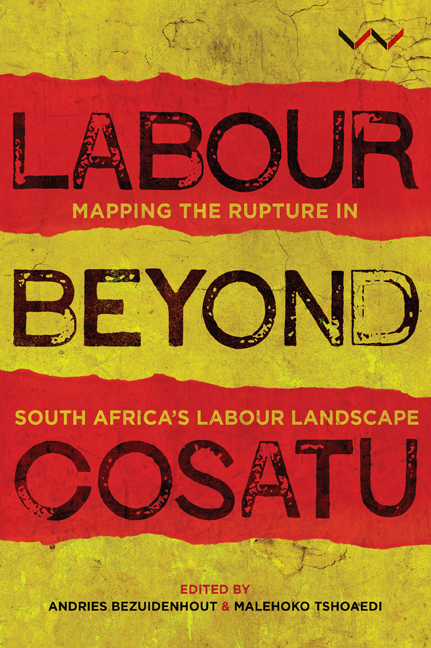Book contents
- Frontmatter
- Contents
- Figures and Tables
- Abbreviations and Acronyms
- Preface
- Chapter 1 Democracy and the Rupture in South Africa's Labour Landscape
- Chapter 2 Research in a Highly Charged Environment: Taking Democracy Seriously, 2014
- Chapter 3 The Social Character of Labour Politics
- Chapter 4 Is Cosatu Still a Working-Class Movement?
- Chapter 5 Labour Aristocracy or Marginal Labour Elite? Cosatu members' income, other sources of livelihood and household support
- Chapter 6 The Politics of Alliance and the 2014 Elections
- Chapter 7 Cosatu, Service Delivery, Civil Society and the Politics of Community
- Chapter 8 The Politics of Male Power and Privilege in Trade Unions: Understanding sexual harassment in Cosatu
- Chapter 9 Internal Democracy in Cosatu: Achievements and challenges
- Chapter 10 Public Sector Unions in Cosatu
- Chapter 11 Are Cosatu's Public Sector Unions Too Powerful?
- Chapter 12 Labour Beyond Cosatu, Other Federations and Independent Unions
- Contributors
- Index
Chapter 1 - Democracy and the Rupture in South Africa's Labour Landscape
Published online by Cambridge University Press: 21 March 2018
- Frontmatter
- Contents
- Figures and Tables
- Abbreviations and Acronyms
- Preface
- Chapter 1 Democracy and the Rupture in South Africa's Labour Landscape
- Chapter 2 Research in a Highly Charged Environment: Taking Democracy Seriously, 2014
- Chapter 3 The Social Character of Labour Politics
- Chapter 4 Is Cosatu Still a Working-Class Movement?
- Chapter 5 Labour Aristocracy or Marginal Labour Elite? Cosatu members' income, other sources of livelihood and household support
- Chapter 6 The Politics of Alliance and the 2014 Elections
- Chapter 7 Cosatu, Service Delivery, Civil Society and the Politics of Community
- Chapter 8 The Politics of Male Power and Privilege in Trade Unions: Understanding sexual harassment in Cosatu
- Chapter 9 Internal Democracy in Cosatu: Achievements and challenges
- Chapter 10 Public Sector Unions in Cosatu
- Chapter 11 Are Cosatu's Public Sector Unions Too Powerful?
- Chapter 12 Labour Beyond Cosatu, Other Federations and Independent Unions
- Contributors
- Index
Summary
INTRODUCTION: BETWEEN PARTICIPATORY AND REPRESENTATIVE DEMOCRACY
The decision in the early morning hours of Saturday, 8 November 2014, to expel Numsa from Cosatu was taken by the federation's Central Executive Committee (CEC). Cosatu's CEC is made up of the federation's national office bearers and the chairperson and provincial secretary of each of the federation's provincial structures. The CEC also includes two representatives from affiliate unions with fewer than 80 000 members and four representatives from affiliate unions with more than 80 000 members; these representatives are usually the presidents, deputy presidents, general secretaries and assistant general secretaries of such affiliates. Thirty-three CEC members voted for the expulsion of Numsa and twenty-four against. Numsa was quick to point out that a momentous decision had been taken by a small number of elite labour leaders, and challenged the federation to call a special national congress to reconsider the decision. Such a congress would constitute the federation's highest decision-making body and would be made up of shop stewards with voting rights in proportion to the number of paid-up members of each affiliate union.
One of the key agitators for the expulsion of Numsa from Cosatu was Frans Baleni, then the general secretary of the once powerful NUM. When conducting fieldwork for another project in the Free State, we were told by NUM shaft stewards of how Baleni had been challenged from the floor at the NUM's regional congress there. He was asked why such an important decision had been taken at the federation's central level, and was also questioned on whether he had received a mandate from his union to expel Numsa. Baleni's response was that he had been elected as general secretary. At the following NUM national congress, Baleni lost his position to David Sipunzi, the union's secretary for the Free State region. Irvin Jim, Numsa's general secretary, was quoted in the media: ‘The mine workers said we need new leadership that will champion accountability and take mandate direct from the workers’ (eNCA 2015). The NUM nevertheless ratified Cosatu's decision to expel Numsa at this congress, so even though Baleni was defeated in the election, the NUM congress ratified the controversial decision to expel Numsa. Union politics, like national politics, tend to be messy.
- Type
- Chapter
- Information
- Labour Beyond CosatuMapping the Rupture in South Africa's Labour Landscape, pp. 1 - 17Publisher: Wits University PressPrint publication year: 2017



